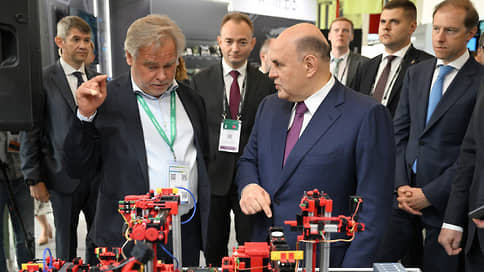Solid code for solid gentlemen
[ad_1]

To speed up the transition of the Russian industry to domestic software, the White House is ready to facilitate access for systemically important developers to contracts of large customers – state-owned companies. The need to provide such preferences to IT businesses that are ready to invest in product development to meet customer requirements is explained by the fact that there are no longer enough budget grants for such projects. Among other considered developer support tools is assistance in attracting venture capital investment in IT industry areas.
The plenary session of the Digital Industry of Industrial Russia-2023 (CIPR) conference taking place in Nizhny Novgorod on Wednesday was devoted to the process of replacing foreign software (SW) at Russian enterprises.
Recall that the White House has been dealing with this problem since last summer. To solve it, industrial competence centers (ICCs) have been organized, bringing together representatives of industries that need to replace foreign software, as well as development competence centers (CCD), bringing together Russian developers. As Mikhail Mishustin said at the conference yesterday, more than 160 projects worth a total of 210 billion rubles have been approved within the framework of the ICC. Only 10% of this amount is financed by federal grants, the rest is the own funds of enterprises.
The prime minister said that the government is ready to make it easier for systemically important developers (the bill on conferring such a status was submitted to the State Duma in February and has not yet been considered) access to contracts of state-owned companies – “provided that these investments go exclusively to the development of digital products.” In this regard, Mikhail Mishustin instructed the Ministry of Finance and the Ministry of Digital Development, taking into account the submitted draft, to prepare amendments to the legislation establishing the status of the sole supplier for systemically important developers.
The head of the Ministry of Digital Development, Maksut Shadayev, at a meeting with ARPP “Domestic Soft” in April of this year, explained that companies that invest in the development of their solutions taking into account the needs of customers can become systemically important – according to the formula “market in exchange for investments”. Accordingly, the state will ensure the demand for such a product of developers and preferences in procurement.
It should be noted that such a new type of support for developers, apparently, was required due to the fact that the funds allocated through the grant mechanism are no longer enough for all approved projects (for more details, see Kommersant dated November 25, 2022). And in general, as Maxim Parshin, Deputy Minister of Digital Development, noted earlier, grants to support software development are still an exceptional measure of support.
Another way discussed at the conference to raise money in the IT industry is venture financing. In particular, we are talking about the creation and launch of funds for investing in IT industry areas. “Well, if more companies start creating such industry venture funds, this will have a creative effect, first of all, for young startups that need resources to implement their ideas and projects,” Mikhail Mishustin said. He instructed the Ministry of Finance, the Ministry of Digital Development and the Ministry of Economy to prepare amendments to the legislation to stimulate the attraction of venture capital investments in Russian IT companies.
Another initiative is the introduction of mandatory contributions from companies for the use of foreign software. It is assumed that half of the money collected in this way can be directed to grant support for Russian IT companies, and half to the formation of a collateral for their preferential lending. This issue is yet to be worked out by the Ministry of Finance. Now, due to the lack of collateral, companies are having difficulty accessing soft loans (for more details, see Kommersant of May 16).
In general, at CIPR, the authorities tried to convey to business the idea that the process of import substitution of software has entered an irreversible phase. “Colleagues, let’s not have any illusions: you won’t be able to sit out,” the head of government warned. Industries that have not yet started implementing projects in this area (pharmaceuticals, trade, food and processing industry, crop production), Mikhail Mishustin urged to start this work as soon as possible.
Venera Petrova
[ad_2]
Source link






